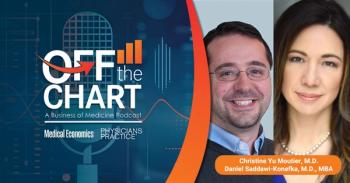
Overcoming physician burnout in the midst of a global pandemic
Addressing burnout is crucial to your long-term happiness and success as a physician.
Physician burnout was a problem before COVID-19 appeared, and the pandemic has only increased the levels of burnout among all of our healthcare providers. During a recent webinar with Locumstory.com, Dike Drummond,
The three symptoms of burnout
The primary symptom of burnout is exhaustion, both physical and emotional, says Drummond. He compares doctors to parents: both often put someone else’s interests ahead of their own, regardless of the circumstances.
The second symptom of burnout is cynical sarcastic venting, also known as compassion fatigue. “Venting can be dangerous. It's never healthy but I see a lot of doctors who are under stress, and who will get upset for righteous reasons,” says Drummond. “They'll go and vent on the table, get angry, and vent just enough steam that it gives them the ability to go back out into their practice and keep doing the very same thing.
The final symptom is asking “What's the use?” or a loss of hope and vision. Drummond says this is when you begin to doubt the purpose and meaning in what you do, and you start to fear that if something doesn’t change, it may negatively affect your patients.
COVID-19 is making burnout worse
Taking those traditional burnout symptoms and throwing in a global pandemic is not a recipe for success. The pandemic has added a whole other level to what physicians face on a daily basis. You may be treating COVID-19 positive patients and dealing with the stress that comes from that; or, you may not be treating any patients due to the drop in elective procedures and patients who are fearful of COVID-19.
”Everybody who's been involved in the carnage is traumatized. There will be PTSD in the wake of this,” says Drummond. “Then there's the economic impacts on you and your finances, on the shellacking the healthcare industry has taken, especially in the second quarter of this year, the general economy, then there's an election, political polarization, shooting in the streets, a potential second wave that we may be in the middle of right now. It just never ends.”
This perfect storm of stressors makes life at work harder while also making it more difficult to recharge when you are at home. Drummond talks about how these added worries make it more important than ever to focus on taking good care of yourself and your family.
“You also need to take care of the people that are closest to you on your work teams, the people that help you see patients in your intimate work team and your call rotation,” says Drummond. “Take really good care of each other, have each other's back, check in early and often. These are extraordinary times, and we are nowhere near the end of it.”
Finding your strategies to fight burnout
So, you know you’re burned out and the pandemic is just making things worse—what now? Dr. Drummond outlines three ways to help you identify what you can change to feel less burned out.
- Describe your ideal practice. Write it down. What kind of patients do you want to see, what do you want to do, how much do you want to be paid, etc. Keep writing until you have documented everything you are looking for.
- Create your Venn diagram of happiness. Compare your ideal practice with your actual practice. Identify areas where they overlap.
- Build a plan to match your current practice with your ideal plan. Figure out what needs to happen to align your current practice with your ideal practice. Start by taking one item on your list at a time and start making plans for how you can change.
He recommends not doing this alone, and getting your team involved to help you make the changes. The best way to start this is with daily team huddles. Drummond says:
“Here's the basic huddle. Very simple. Twice a day if you have morning and afternoon patients. If you’re on the OR, huddle in the OR. If you're in a hospice, huddle however many times you need to. You can call a timeout at any time of the day and huddle up again if things get hairy. Your whole team. Run your schedule, bring it back, look at all the patients, look at all the vacant slots, tell them how you want to book. Make sure the patients have everything they need before they get there and make sure you know who's sick out in the waiting room. You're preventing fires in the first place, and ideally—key points here —this is a stand-up meeting where you go to them. I've seen doctors who gather the people around them as they sit like kings and queens at their desk in their office. That does not work. So, please stand up and go to them.”
For the physicians that Dr. Drummond works with, he finds that 70% are able to make enough changes to their existing practice to recover from burnout. The other 30% start the process of a new job search to find their ideal practice.
Whether you just need to make changes in your existing job or find a new one, addressing burnout is crucial to your long-term happiness and success as a physician. For more tips from Dr. Drummond, you can watch the full webinar on
About the Author
Newsletter
Optimize your practice with the Physicians Practice newsletter, offering management pearls, leadership tips, and business strategies tailored for practice administrators and physicians of any specialty.









